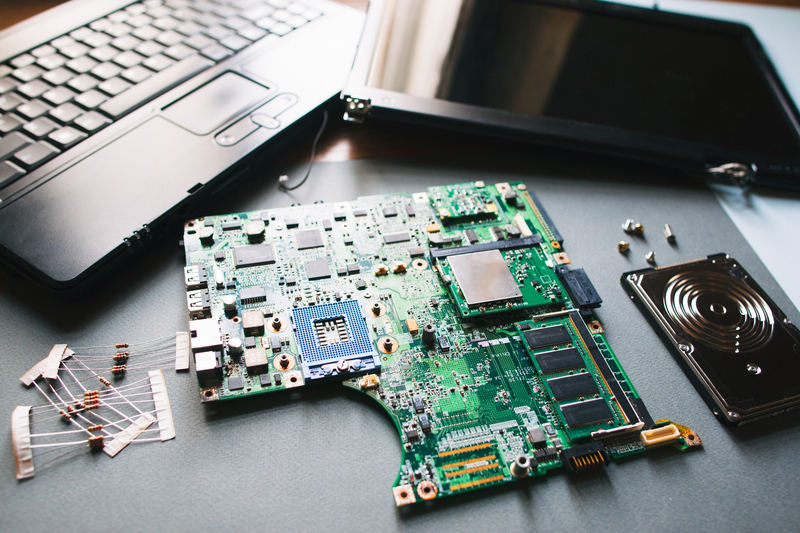Earth-Friendly Ways to Break Up With Your Old Cookware
Out with the old, in with the green! Our kitchens are evolving daily, but what about the cookware we no longer use? Instead of tossing it into the trash and contributing to global waste, let's discover sustainable methods to bid farewell to old pots, pans, and utensils. This comprehensive guide explores eco-friendly ways to dispose of outdated cookware so you can keep your kitchen--and the planet--clean and green.
Why Think Twice Before Disposing of Old Cookware?
Every year, millions of pounds of kitchenware end up in landfills, polluting our Earth and wasting valuable resources. Most cookware contains metals, plastics, ceramics, or chemical coatings that break down slowly or not at all. Eco-conscious cookware disposal benefits the environment and helps conserve resources. By choosing earth-friendly ways to break up with your old cookware, you help reduce landfill waste, conserve virgin materials, and minimize your carbon footprint.
The Environmental Impact of Cookware Waste
- Metal Pollution: Cookware made from stainless steel, aluminum, and copper takes centuries to decompose and can leach harmful substances.
- Nonstick Coatings: Pans with Teflon and PTFE coatings release toxic gases when heated or incinerated, polluting the air and soil.
- Plastic Handles: Many pans have plastic components, which are non-biodegradable and can break down into harmful microplastics.

Step One: Assess the Condition of Your Old Cookware
Before deciding on a disposal method, evaluate the condition of your old cookware. Some options, like donation or resale, require the items to be in usable shape, while recycling is best for broken or heavily worn pots and pans.
- Still functional? Minimal scratches, intact handles, and non-flaking coating may mean it's suitable for reuse or donation.
- Unsafe for cooking? Warped, heavily scratched, rusted, or chipped cookware should not be used but may still be recycled or upcycled.
Donate: Give Your Cookware a Second Life
If your pots, pans, or kitchen utensils are still in good, usable condition, consider donating them to someone in need. This is one of the most eco-friendly ways to part with cookware and keeps your items out of landfills.
Where to Donate Used Cookware
- Local Charities: Homeless shelters, women's refuges, and organizations that help low-income families often accept kitchenware donations.
- Thrift Stores: Places like Goodwill, Salvation Army, and other secondhand shops sell gently used cookware to fund charitable causes.
- Community Groups: Websites like Freecycle, Buy Nothing groups, or local Facebook Marketplace communities are excellent platforms for giving items away for free.
- Schools and Churches: Some community centers, schools, or churches welcome cookware for classrooms, group kitchens, or fundraising events.
Tips for Donating Old Cookware
- Clean and sanitize pots, pans, and utensils thoroughly.
- Bundle cookware in sets whenever possible--savvy donation centers will appreciate matched items.
- Check if your chosen organization has specific donation guidelines or accepted item lists.
Sell or Swap: Extend the Life of Usable Cookware
If your cookware is still in decent condition, but you simply want to upgrade, consider selling or swapping it. Rehoming old cookware keeps items in circulation and reduces the demand for new products.
How to Sell or Swap Used Cookware
- Garage Sales: List your items in local yard sales, community events, or flea markets.
- Online Marketplaces: Platforms like Craigslist, eBay, Facebook Marketplace, and OfferUp make it easy to connect with buyers looking for affordable kitchenware.
- Swap Events: Attend a swap meet or host a kitchen swap party with friends, neighbors, or fellow cooks--one person's extra skillet might be someone else's new treasure!
Tidying up your kitchen and making some extra cash is an excellent, earth-friendly way to break up with old cookware.
Recycle: Transform Old Cookware Into Raw Materials
If your cookware is damaged, cracked, warped, or no longer safe to use, recycling is a sustainable way to dispose of old pots and pans. Most metal cookware types can be recycled as scrap metal, granting them a new life as raw material for other products.
How to Recycle Old Cookware Responsibly
- Identify the Material: Cookware is typically made from stainless steel, aluminum, cast iron, or copper. Find out what your items are made of, as most scrap collectors separate metals for processing.
- Remove Non-Metal Components: Handles made of plastic, silicone, or wood often need to be removed before recycling. Use a screwdriver or pliers--follow safety guidelines!
- Find a Scrap Metal Recycling Facility: Contact your local recycling center or municipal waste department to locate facilities that accept cookware. Some metal recyclers will even pay for materials like aluminum and copper.
- Drop Off Your Cookware: Take your sorted and stripped items to the facility. Many centers have bins dedicated for different metals.
What About Nonstick and Coated Cookware?
Recycling nonstick pans can be tricky. Some facilities will not accept cookware coated with Teflon, PTFE, or ceramic due to disposal challenges. However, some manufacturers now offer take-back recycling programs for their products.
- Check Brand Programs: Major brands like Calphalon and GreenPan sometimes offer pan recycling programs--visit their websites for details.
- Earth911 and Recycle Nation: Use these websites to find specialized recycling solutions for nonstick cookware in your area.
Upcycle: Get Creative With Your Old Cookware
Instead of throwing away battered pots and pans, why not repurpose old cookware for new uses around the home or garden? Upcycling is a fun, earth-friendly way to say farewell to kitchen items past their prime.
Fun Upcycling Ideas for Old Pots and Pans
- Garden Planters: Drill a drainage hole, add soil and your favorite herbs or flowers, and transform that skillet or saucepan into a unique planter.
- Wall Art: Arrange an array of vintage pans on your kitchen or patio wall for a rustic-chic look.
- Bird Feeders: Attach a small pan to a tree branch, fill with seeds, and provide a stylish snack station for feathered friends.
- Organizer Trays: Use shallow pans as catch-all trays for tools, jewelry, or keys.
- Craft Projects: Let kids decorate old cookware with paints and stickers, then use them as toy storage or for art displays.
Manufacturer Take-Back Programs
Some cookware companies now prioritize sustainability with take-back or recycling initiatives for consumers. If you're upgrading your kitchen, look into whether the manufacturer of your new or old cookware offers earth-friendly disposal services.
Examples of Company Recycling Programs
- Calphalon: Their "Recycle Your Cookware" program accepts stainless steel, nonstick, and hard-anodized aluminum pans by mail.
- TerraCycle: In partnership with some brands, TerraCycle accepts cookware and kitchen tools for recycling.
- Local Retail Stores: Some home goods stores collect old cookware during buy-back or trade-in drives.
Earth-Friendly Disposal for Specialized Cookware
Ceramic and Glass Cookware
Ceramic and glass dishes often can't be placed in curbside recycling due to their durability and additives. Instead:
- Look for landfill diversion programs at local waste facilities.
- Repurpose them for serving trays, garden markers, or mosaic art projects.
- Contact ceramics or pottery studios to see if they accept broken pieces for projects.
Cast Iron Pans
Seasoned cast iron cookware is beloved for its longevity, but when it's truly beyond saving:
- Contact scrap metal recyclers--they often welcome cast iron for recycling.
- Clean thoroughly; avoid pouring rust or grease down drains.
- Get creative: use old pans as doorstops, garden stepping stones, or for rustic decor.
Reducing Waste: Tips for a More Sustainable Kitchen
Of course, the most earth-friendly way to break up with cookware is to reduce the frequency with which you have to do it! Choose long-lasting, repairable cookware and practice mindful maintenance.
How to Extend the Life of Your Cookware
- Follow Manufacturer Guidelines: Clean and care for your pots and pans according to their instructions.
- Avoid Metal Utensils: Use wood, silicone, or plastic to prevent scratching nonstick or coated surfaces.
- Store Smart: Stack cookware carefully to avoid dents and chips.
- Regular Maintenance: Reseason cast iron; replace loose screws or handles; avoid putting non-dishwasher-safe items in the dishwasher.
When you do need to upgrade, consider buying from brands with sustainable manufacturing processes, or choose cookware made from recycled, recyclable, or easily upcycled materials.

Frequently Asked Questions: Responsible Cookware Disposal
Q: Can I put old pots and pans in the regular recycling bin?
A: Usually, no. Most curbside recycling programs do not accept large metal, ceramic, or glass cookware. Take them to a dedicated recycling center or scrap metal facility.
Q: Is it safe to donate cookware with minor scratches?
A: If the pan is otherwise functional and not rusted, both charities and individuals may still benefit from it. Avoid donating items with flaking nonstick coatings, deep rust or chips, or severe warping.
Q: Should I remove plastic or wooden handles before recycling?
A: Yes. Most recyclers prefer cookware stripped of plastic, silicone, or wooden handles, as these cannot be processed with metal scrap. Check your local guidelines for specifics.
Q: What should I do with broken glass lids?
A: Broken glass cookware lids are usually not recyclable in standard curbside bins. Wrap them securely and dispose of according to municipal hazardous waste policies, or find a pottery/glass recycling program.
Final Thoughts: Make Your Kitchen Greener, One Pan at a Time!
Every item in your kitchen has a lifecycle. When it's time to retire your old cookware, choose an earth-friendly farewall. Whether you love the idea of donating reusable kitchenware, reselling for extra cash, recycling for a cleaner Earth, or getting creative with upcycling projects, the effort you make helps preserve our environment for future generations.
By embracing these eco-friendly methods to dispose of old cookware, you minimize your ecological footprint, support your local community, and set a sustainable example for others. So the next time you're eyeing a set of shiny new pots, don't forget--there are earth-friendly ways to break up with your old cookware that are better for both your kitchen, and the planet.
```